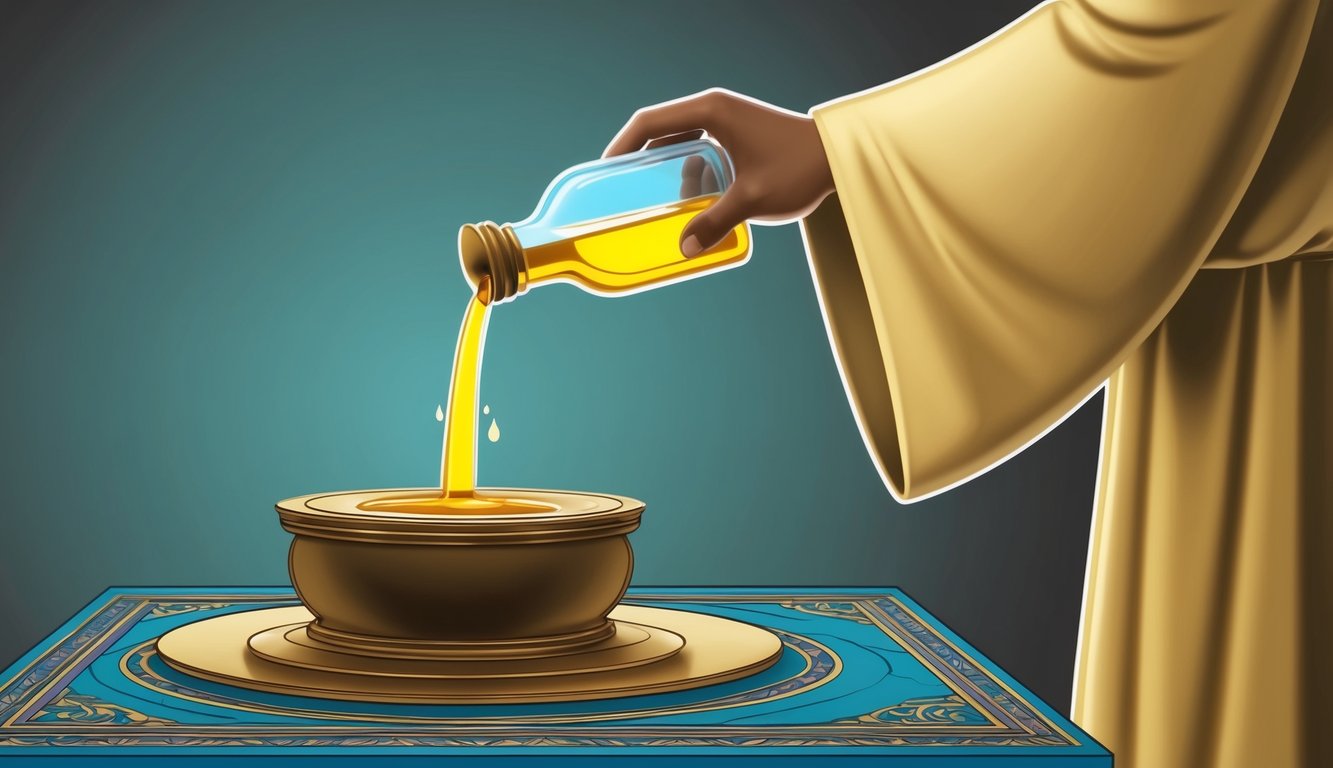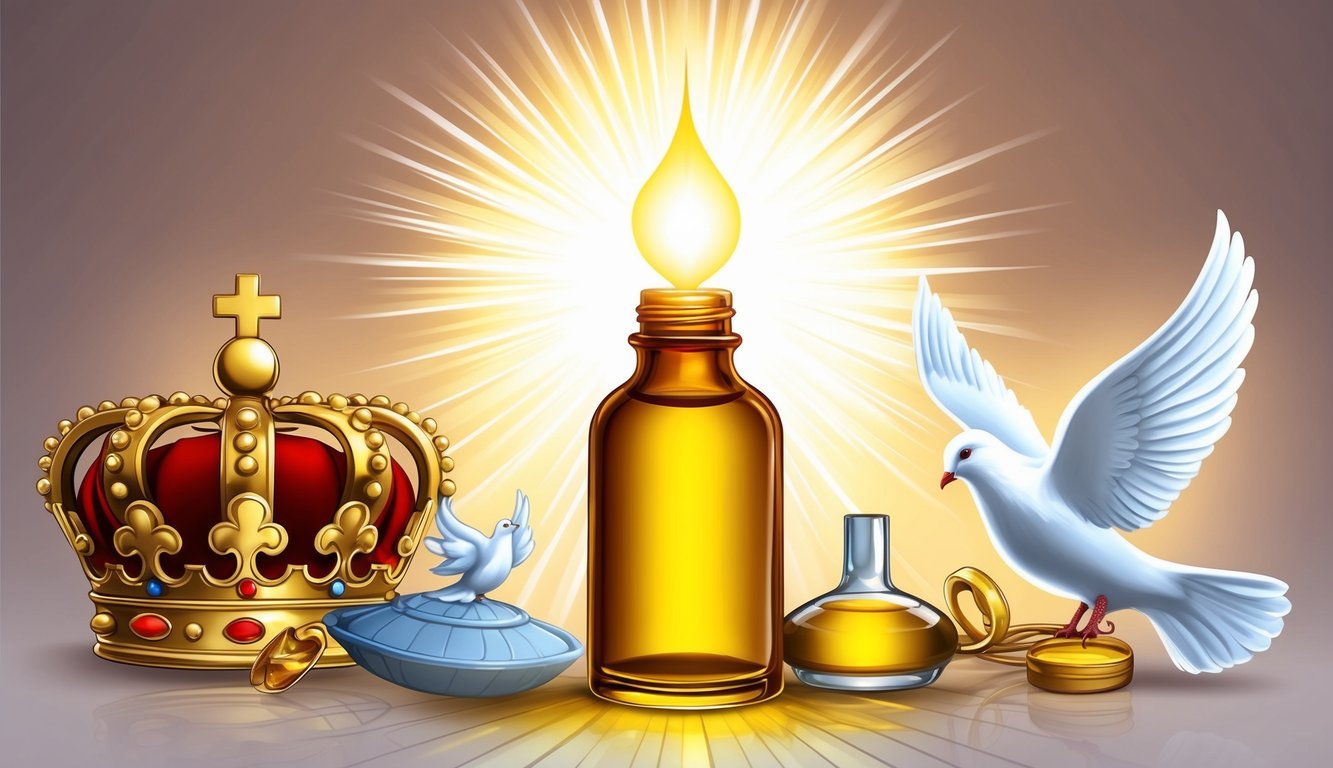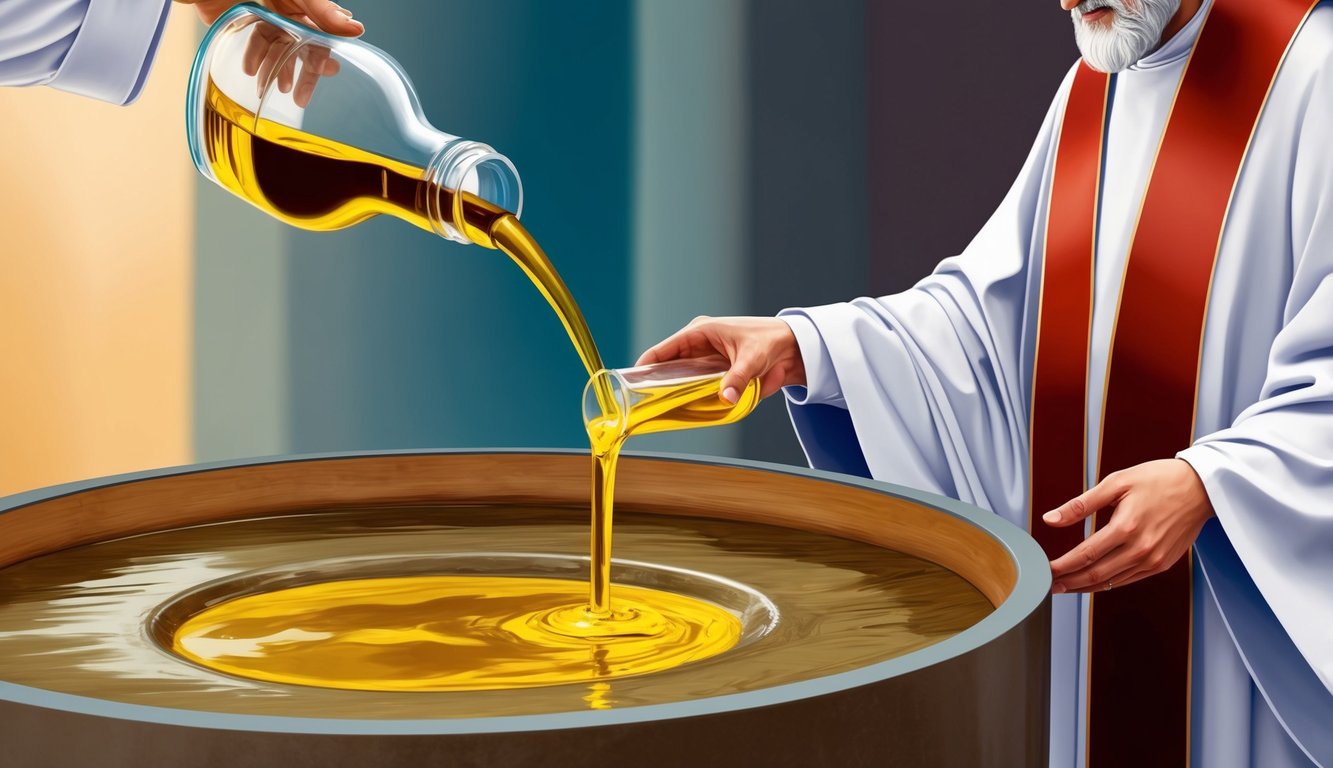Don’t Miss Out On This Unique Astrological Opportunity
Are you tired of spinning your wheels and getting nowhere? Simply put, you’re out of sync: you’re out of alignment with your astral configuration.
But: there’s a kind of map that can help you reclaim your alignment. Think of it as your own personal blueprint to success and happiness: a blueprint that will help you live your most amazing life.
Get started here.
Anointing has deep roots in history and is a practice rich in symbolism and meaning.
You may wonder, what exactly is the meaning of anointing? Typically, it refers to the act of pouring or smearing oil on someone or something as part of a religious or cultural ritual.
This practice is often seen as a way to consecrate someone to a holy purpose, signifying a sacred bond or divine favor.
In ancient cultures, anointing was commonly used to appoint kings or officials.
In ancient Egypt, for example, it was a ritual act indicating the start of one’s term in office.
In the religious context, especially within Christianity, it represents the presence or work of the Holy Spirit, often marking a person’s dedication to spiritual service or healing.
Today, anointing continues to hold significance across different faith traditions, adapting to modern interpretations.
Oils used in these ceremonies can vary but often include ingredients with symbolic meaning.
Whether it’s a part of church services or personal religious practices, anointing remains a powerful symbol of devotion and spiritual connection.
Key Takeaways
- Anointing is a symbolic act often using oil.
- It has historical roots in both religious and cultural practices.
- Modern anointing practices continue to hold spiritual significance.
Historical and Cultural Context of Anointing

The practice of anointing has a rich historical and cultural tapestry, affecting religious and political spheres across civilizations.
It involves symbolic acts such as the use of olive oil and the designation of leaders and spiritual figures as ‘anointed ones.’
Anointing in Ancient Traditions
In ancient traditions, anointing was both a sacred and social act.
Among the ancient Hebrews, it was common to anoint individuals using olive oil as a sign of consecration and divine blessing.
The Hebrew word mashach is related to anointing, and this root word is linked to both messiah and ritual anointing practices.
Anointing rituals varied, but many were intended to purify or designate a person for a special role within the community.
In cultures outside the Hebrew tradition, such as those in Egypt or Mesopotamia, anointing played a part in daily life, marking religious ceremonies and special occasions.
This practice is still present today in various religious rituals, including the Christian rite of baptism.
Biblical References and Symbolism
Anointing holds deep symbolic meaning within biblical texts.
It is mentioned numerous times in the context of designating kings, priests, and prophets—as seen in figures like King Saul and David, who were spiritually prepared to lead through anointing.
The act signified spiritual empowerment and the conferral of divine favor.
In the New Testament, Jesus is recognized as the “Anointed One,” interpreting His role and mission.
This association with messianic prophecy enriched the significance of anointing in Christian belief, illustrating spiritual truths and the importance of divine selection and empowerment.
The Role of Anointing in Coronations and Leadership
Throughout history, anointing has been integral to coronations and leadership designations.
The anointing of kings established both divine approval and legal authority, setting the leader apart as chosen.
It reinforced the idea of a God-given right to rule and brought a sense of legitimacy and sanctity.
In medieval Europe, royal coronation ceremonies prominently featured anointing, linking religious and political powers.
This practice continues to influence modern monarchy traditions, where anointing reflects continuity between ancient and contemporary governance structures.
The ritual illustrates the deep-rooted belief in the divine right of kings, solidifying their roles within society.
Religious Significance and Practices

Anointing carries deep roots within many religious traditions.
It symbolizes consecration, healing, and the presence of the Holy Spirit.
This practice uses special oils and holds valuable roles in various religious ceremonies.
Anointing in Christian Theology
In Christian theology, anointing is a significant ritual symbolizing the power of the Holy Spirit.
It often represents blessings and consecration. Jesus Christ, referred to as the “Anointed One,” shows this importance.
When someone is anointed, they are set apart for a sacred purpose.
Anointing plays a key role in acts of healing and spiritual protection, often called spiritual warfare.
Through the act of anointing, participants receive spiritual strength and purity.
Historically, high priests and kings were anointed as a sign of divine favor and authority.
Sacramental Oils and Their Uses
Chrism, holy oil, and consecrated oil are key elements in religious rites.
They are often used in ceremonies like baptism, confirmation, and ordination.
Chrism is a mix of olive oil and balsam, usually consecrated by a bishop.
The oils represent the presence of the Holy Spirit and are essential in various sacraments.
Spiritual and physical healing often involves these oils, invoking faith and the power of worship.
Whether used for healing the sick or marking a sacred endeavor, the oil serves as a symbol of divine presence.
Consecration and Ordination
Anointing is central to consecration and ordination ceremonies.
During these rituals, individuals are set apart for specific roles, such as priests or bishops.
The Holy Spirit’s guidance is emphasized through anointing.
Consecration of objects, such as altars and religious artifacts, is also carried out with specially prepared oils.
By doing so, these items are marked for sacred purposes.
Anointing transforms ordinary elements into significant religious symbols, deeply rooted in faith and tradition.
This ritual connects the physical and spiritual realms through an act of devotion and ceremony.
Anointing Oils and Their Composition
Anointing oils have spiritual and historical significance, often used in religious rituals and ceremonies.
Understanding the composition and process of creating these oils can provide insight into their sacred roles.
Properties and Ingredients
Anointing oils are typically made from a base of olive oil, which acts as a carrier and is a key ingredient due to its symbolic and practical qualities.
Olive oil is known for its purity and is mentioned frequently in religious texts.
To enhance the fragrance and spiritual significance, scented oils like myrrh and spices are often added.
Myrrh, derived from the resin of certain trees, adds a sweet, balsamic scent and is historically valued for its calming properties.
Other ingredients might include cinnamon or calamus, which contribute to the unique essence of the oil.
Creating and Consecrating Anointing Oils
The creation of anointing oils involves more than just mixing ingredients.
The process is a ritual in itself, where each element is added with intention and care.
The holy oil is often blended with specific proportions of olive oil, myrrh, and other spices, all carefully combined.
Consecration involves blessing the oil through prayers and specific religious rites.
This act transforms the oil into a chrism, or consecrated oil, filled with symbolic meaning.
The oil is believed to carry the “spirit of the Lord,” which makes it sacred and suitable for use in various ceremonies, like baptisms and ordinations.
Anointing Within Modern Practices and Interpretations
In today’s world, anointing holds various roles, touching aspects like healing, protection, and worship.
This practice continues to shape spiritual journeys and religious experiences.
Anointing for Healing and Protection
Anointing with oil is often used for healing and protection.
It is common to see this in religious practices where oil symbolizes the presence and blessing of the divine.
You might witness anointing of the sick, where oil is placed on a person’s forehead.
This act is a call for spiritual and physical healing, rooted deeply in ancient rituals.
In the Bible, the practice was used for prophets and spiritual warfare, like when warriors would anoint their shields.
Today, believers might anoint doorways to protect their homes and seek divine guardianship against harm.
Symbolic Acts of Anointing in Contemporary Worship
In modern worship, anointing serves as a powerful symbol.
When you take part in these rituals, anointing can connect you to faith’s deeper meanings.
It represents devotion and commitment.
It is a practice that signifies spiritual cleansing and a renewal of one’s dedication to their beliefs.
While symbols like anointing oil carry sacred connotations, others, such as the upside down cross meaning, are often misunderstood and can represent humility or different theological interpretations.
Understanding these symbols helps deepen one’s connection to faith and its rich traditions.
During worship services, oil might be used to anoint leaders or new members, echoing the biblical tradition of anointing prophets for their roles.
This symbolic act may remind you of events like the anointing of Jesus, representing honor and respect.
In settings of hospitality, anointing might also appear in welcoming ceremonies.
Here, it signifies peace and acceptance, reinforcing community ties and spiritual unity.
Frequently Asked Questions

Anointing holds deep spiritual significance across various religious contexts.
It involves spiritual empowerment, different manifestations, and plays a crucial role in the believer’s spiritual journey.
What does it mean to be spiritually anointed?
Being spiritually anointed means you are set apart and empowered by God to fulfill a specific purpose.
It involves receiving divine favor and blessings to accomplish tasks beyond your human capacity.
Can you explain the seven manifestations of anointing?
The seven manifestations of anointing highlight different aspects such as wisdom, understanding, counsel, might, knowledge, fear of the Lord, and the spirit of the Lord.
Each manifestation empowers you in distinct ways to address spiritual and practical matters effectively.
In what ways is anointing significant in biblical context?
Anointing is significant in the Bible as it symbolizes consecration, authority, and holiness.
It often marks the selection of kings, prophets, and leaders, emphasizing their divine appointment and duty to serve faithfully.
What are common indicators of a person being anointed?
Indicators of someone being anointed can include a noticeable sense of peace, increased spiritual insight, and the ability to positively influence others.
Their actions and words might also reflect spiritual wisdom and guidance.
How does one receive anointing from God?
Receiving anointing from God often involves prayer, devotion, and a surrendered heart.
It requires being open to spiritual growth and a willingness to serve according to God’s will.
What role does anointing play in the believer’s life?
Anointing empowers believers to live purposefully and perform their roles with divine guidance.
It also provides the strength to overcome challenges, share their faith, and make a meaningful impact in their communities.



